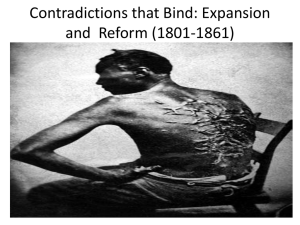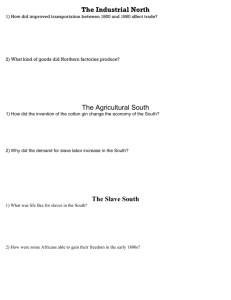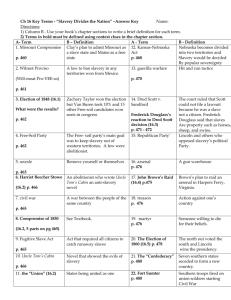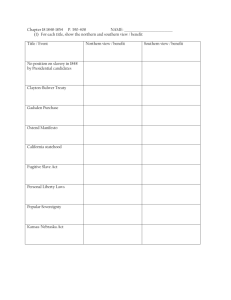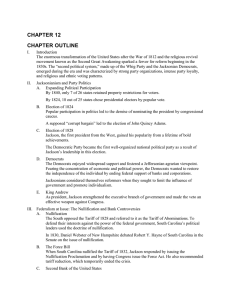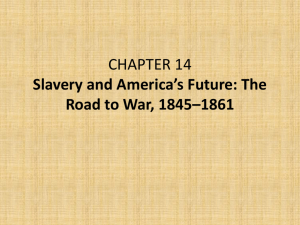The Disunited States of America
advertisement
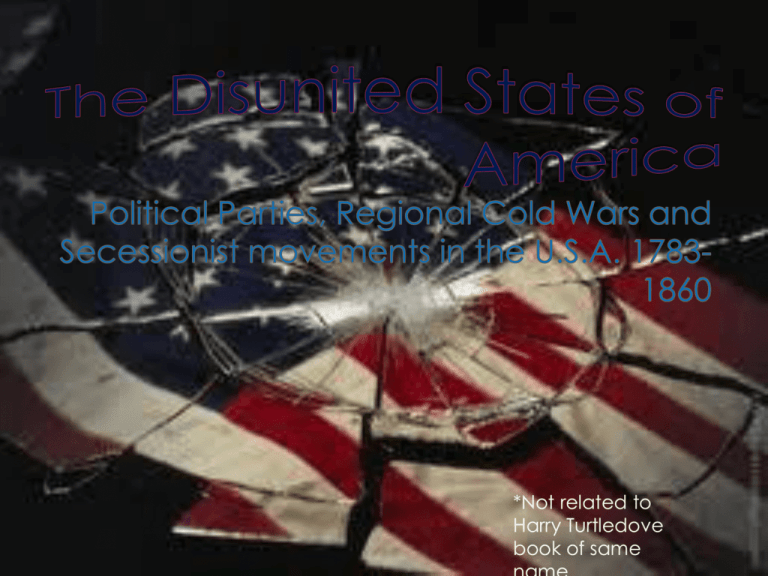
*Not related to Harry Turtledove book of same Most important parties are Democratic Republican, Federalist, Democratic and Whig. George Washington hoped that their new country would have unity and be motivated by common purpose. It washttp://edsitement.neh.gov/lessonnot to be. plan/first-american-party-system-uspolitical-parties-principle-legitimateopposition The Federalists (of which George Washington was one) were led by Alexander Hamilton and supported giving more power to the federal government. They www.coloradohumanities.org also loosely The DemocraticRepublicans were led by Thomas Jefferson and felt that minimum federal interference in state affairs was the best policy. They used a strict interpretation of the constitution to http://faculty.poly technic.org/gfeld meth/chart.feddr. pdf Like today’s Democrats Like today’s Republicans The DemocraticThe Federalists Republican party split in weakened after 1824 over whether to 1808 and became support Andrew Jackson or unpopular due to John Quincy Adams. The opposing the war of Democratic party and the 1812. The party died New Republican party during the 1820s formed as a result of the because the things it split. The New Republicans supported ( national would soon become the bank, commerce) Whigs. were not popular with many of the regular citizens. http://www.gilderlehrman.org/historyby-era/early-republic/timelineterms/democratic-republican-party http://www.history.com/topics/federali st-party Important parties are the democrats, the Whigs, the free soilers and the republicans. http://nkogan.wordpress.com/2012/01/ 07/political-party-timeline-anoutstanding-example-of-informationreorganization/ The increasing controversy of slavery led to factions of the Whig party ( which was the alternative to democrats) splitting off and becoming the Free Soil party. They were one of many parties formed to advocate the abolition of slavery. The free soilers, elements of the Whigs and the nativist knownothing party formed the modern Republican party. The green is Breckinridge, the southern democrat canidate. The 1860 presidential election saw the southern democrats split from the main democratic party ( and secure Lincoln's election ironically) The result of Lincoln’s victory was secession and civil war. The rapid formation and dissolution of political parties can seen as just one part of a larger regional struggle, one which until 1860 was largely a cold war between the agricultural southern states and the industrial northern states that dated back to the founding of the republic. The exact phase of the “ real “ cold war that this corresponds closest to is the Détente period of the 1970s The regional cold war was brutal, leading to www.smithsonianmag.com intense shouting matches, fighting in the capitol building and www.dipity.com eventually, a civil war. The origin can be found in the different visions that the federalists and DemocraticRepublicans had for the country. The Federalists dreamed of a commercial empire for the young republic, while the D-Rs believed in the notion of the citizen farmer being the ideal person for the nation. The regions mirrored the split in thinking, with the northern states developing into industrial areas ( and supporting the federalists though the middle states defected to the D-Rs) while the rural, agricultural southern states supported the D-Rs. www.symonsez.wordpress.com Slavery led to the states polarizing along 2 axes: slave and free. They wanted a constant balance in numbers of states so that their power would not be diminished. Thus every time a new state was added, another state had to be created to counterbalance it. Map from Wikipedia. The Missouri Compromise was the first compromise attempt, splitting the new territories into 2 parts: open to slavery and closed to slavery along 36 degrees north. http://teachers.henrico.k12.va.us/tuck er/strusky_m/webquests/VUS6_madison monroe/MissouriCompromise.html Henry Clay negotiated a compromise that added the fugitive slave act, abolished the Washington D.C. slave trade and let California in. The Fugitive slave act enraged many northerners and only increased the tension. http://www.loc.gov/rr/program/bib/ou rdocs/Compromise1850.html California’s request to enter the union as a free state caused a crises ( because it upset the delicate balance and showed the unsustainibility of their attempts at regional détente . www.ushistory.org Only 4 years after the Compromise of 1850, the Kansas-Nebraska Act was passed and virtually repealed the earlier act. Stephen Douglas ( D-Il) wanted to build a transcontinental railroad in Chicago but had to organize the Nebraska territory to do it. He added popular sovereignty to get southern votes. While the 1850 compromise banned slavery in the Kansas-Nebraska area, the 1854 compromise mandated popular sovereignty to solve the issue of slavery in the territories http://www.milestonedocuments.com/ It would have several documents/view/kansas-nebraska-act unforeseen The northerners started it but a To try to Sharps rifles rumor that stated influence became known as about 20 times the the vote, Beecher’s Bibles actual number pro- and after a minister were coming sent antiwho provided southerners rushing slavery them. to Kansas, which people caused a poured into cascade of Kansas. movement. Many northerners wanted Pro-slavery forces won the land and hated slavery election and set up a because of the large legislature, but northerners plantations. To that end, set up their own they banned blacks from legislature in Topeka. Kansas. Now 2 governments claimed jurisdiction over Kansas. Scattered violence had occurred, but it would escalate due to one attack. Pro slavery men burned a hotel and ransacked homes. John Brown retaliated by killing 5 pro The fighting was slave people. increasing and would spread to congress. Pro slave senator Preston Brooks beat abolitionist senator Charles Sumner with a cane. A new territorial governor restored order. 55 people had died. http://www.pbs.org/wgbh/aia/part4/4 p2952.html The radicalism of the The abolitionists grew abolitionists, spurred on as a movement and by Uncle Tom’s Cabin became more radical, led to the slavers gradual elimination of becoming more firm in slavery wasn’t good their demands. The enough, it had to be country was polarized soon. This view and congressional alienated people in actions weren’t helping. the north as well as the south. Many mill In 1857, the rates on tariffs went down owners depended on by a congressional action. The south slave cotton and loved it, the north hated it. While farmers worried about previously, compromise had the effect that millions happened by common interest, both of freed blacks would side’s interests were starting to diverge take up the land that and some groups were considering they felt should be secession. awarded tohttp://www.civilfree whites. war.net/pages/timeline.asp www.socialstudiesforkids.com More free states were joining and in 1859, John Brown made his ill-fated raid on Harper’s Ferry, Virginia. He was captured and hung. In the south he was viewed as a dangerous maniac but in the north, some viewed him as a martyr. This particular northern view deeply worried the southerners as they perceived an increasingly hostile environment. Picture from Wikipedia Also in 1857 was the Dred Scott Decision. This Supreme court ruling found that blacks weren’t citizens and slaves could be taken into free territory and remain slaves. It was very controversial. The election of 1860 in many ways, foreshadowed what was to come. The southerners split from the Democrats and formed the Southern Democrats. They ignored perhaps rule # 1 of elections: never split voters. Lincoln won the election (despite not being on the ballot in most southern states) and many southerners, dreading the consequences of a Lincoln victory for slavery, prepared to secede. April 12, 1861, LT. Henry Farley sat by his mortar. It was aimed at Fort Sumter and when fired, would serve as a signal to the other guns to start firing. In other words, it would become the first shot of the American Civil War, a culmination of events dating back to the founding of the country, a war that would cause immense devastation and suffering. He fired.


